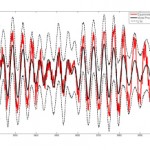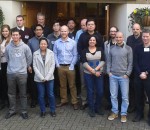Pete Green of the University of Sheffield hosted a Bayesian Workshop supported by the Engineering Nonlinearity (ENL) Programme Grant on 19th February 2014 at Kenwood Hall in the leafy environs of Nether Edge, Sheffield.
There was a good attendance from the Project’s University and Industrial Partners; also guests and speakers from the Universities of Liverpool and Southampton, with about 25 people present in total.
Pete Green started with an overview of the project, and then moved on to present some of the work he had been doing on Markov-Chain Monte-Carlo (MCMC) methods, including an analysis of 3 models used against experimental data obtained from Tore Butlin’s rig at the University of Cambridge, where Pete had recently visited under the auspices of ENL.
Two talks then followed from members of the University of Liverpool’s Institute for Risk and Uncertainty – Francisco Alejandro Diaz De la O of the University of Liverpool with a talk on the theory and applications of approximate Bayesian computation, and Ivan Au: “A connection between Bayesians and frequentists in system identification”. Ivan noted that any difference between frequentist and Bayesian results reflects a modelling error – a key question is how to make use best use of this.
Robin Langley of the University of Cambridge’s talk “Probabilistic Inference for Priors: Maximum Entropy and Fisher Information” showed the power of considering Maximum Entropy and / or Fisher Information as measures of randomness, with a fascinating walk through the history of this area and of the characters involved, but also cautioned against some of the more far-reaching claims for the application of Fisher Information in particular.
Rob Barthorpe of the University of Sheffield then presented progress on the “Identification of Bouc-Wen hysteretic systems”.
Daniela Tiboaca of the University of Sheffield continued with “Bayesian System Identification of Dynamical Systems using Reversible Jump MCMC” – looking to apply RJMCMC to dynamical systems.
Edoardo Patelli of the University of Liverpool’s Institute for Risk and Uncertainty continued with “A Bayesian approach for Uncertainty Characterization: application to the NASA Langley Multidisciplinary UQ Challenge” – a fascinating account of the results obtained in applying a Bayesian approach to tacking this NASA challenge, prompted by the failure to predict certain catastrophic failures in the Space Shuttle programme.
Christophe Lecomte, a visitor at the University of Southampton, closed proceedings with “Minefield of Probability density functions and averaging of dynamic systems for MCMC”, in which the potential benefits of the averaging approach were presented and then discussed by the attendees.
Discussions continued at Prezzo’s restaurant for those able to attend.
Overall an excellent meeting which showcased research having benefitted greatly from the Programme Grant approach, considering Bayesian and Frequentist methodology and their application to real world problems.

